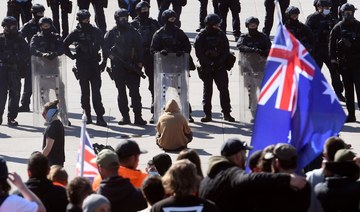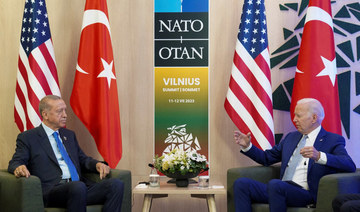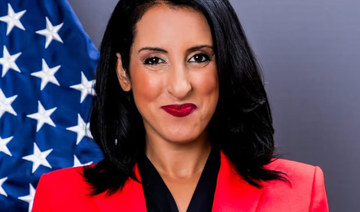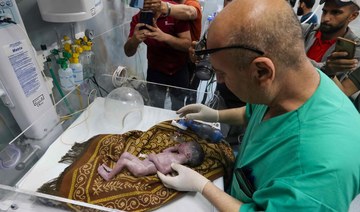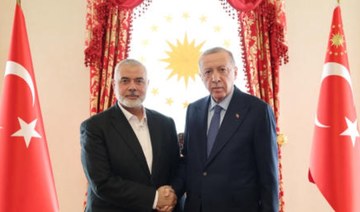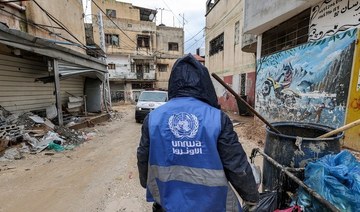JERUSALEM: Israel is pressing ahead with its aggressive campaign of offering coronavirus boosters to almost anyone over 12 and says its approach was further vindicated by a US decision to give the shots to older patients or those at higher risk.
Israeli officials credit the booster shot, which has already been delivered to about a third of the population, with helping suppress the country’s latest wave of COVID-19 infections. They say the differing approaches are based on the same realization that the booster is the right way to go, and expect the US and other countries to expand their campaigns in the coming months.
“The decision reinforced our results that the third dose is safe,” said Dr. Nadav Davidovitch, head of the school of public health at Israel’s Ben-Gurion University and chairman of the country’s association of public health physicians. “The main question now is of prioritization.”
The World Health Organization has called for a moratorium on boosters until at least the end of the year so that more people in poor countries can get their first two doses, but Israeli officials say the booster shot is just as important in preventing infections.
“We know for sure that the current system of vaccine nationalism is hurting all of us, and it’s creating variants,” said Davidovitch, who is also a member of an Israeli government panel of experts. But he added that the problem is “much broader than Israel.”
Israel raced out of the gate early this year to vaccinate most of its adult population after striking a deal with Pfizer to trade medical data in exchange for a steady supply of doses. It has also purchased large quantities of the Moderna and AstraZeneca vaccines.
Most adults had received two doses of the Pfizer vaccine by March, causing infection levels to plummet and allowing the government to lift nearly all coronavirus restrictions.
But in June, the highly infectious delta variant began to spread. After studying the matter, experts concluded that the vaccine remained effective against the virus, but that its efficacy waned roughly five months after the second shot.
In late July, Israel began distributing booster shoots to at-risk citizens, including those over 60. Within weeks, it expanded the campaign to the general population.
More than 3 million of Israel’s 9 million citizens have gotten a third dose of the Pfizer vaccine, according to the Health Ministry.
In a study published last week in the New England Journal of Medicine, Israeli experts said that in people who had been vaccinated five months earlier, the booster increased vaccine efficacy tenfold compared with vaccinated patients who didn’t receive it.
That study tracked about 1 million people 60 and older and found that the booster was “very effective at reducing the rate of both confirmed infection and severe illness,” the Health Ministry said.
A senior Israeli health official, Dr. Sharon Alroy Preiss, was among the experts testifying before the US Food and Drug Administration panel last week in favor of the booster shot. But the regulator decided against boosters for the general population, opting only to authorize it for people aged 65 or older and those in high-risk groups.
Experts cited a lack of safety data on extra doses and also raised doubts about the value of mass boosters, rather than ones targeted to specific groups. The US Centers for Disease Control and Prevention made a similar endorsement Thursday.
The Israeli Health Ministry said the FDA decision “gave validity to the third vaccine operation” underway in Israel, which “decided to act responsibly and quickly in order to treat growing infections.” It said statistics show the booster dose has “restored protection.”
Recent weeks have seen “a declining rate of new infections among the elderly,” the vast majority of whom have received booster shots, and “a continuous increase in the proportion of unvaccinated individuals within the new severe cases,” Dr. Ran Balicer, head of the government’s expert advisory panel on COVID-19, told The Associated Press.
In recent weeks, as the booster campaign has been rolled out, the percentage of unvaccinated among serious COVID-19 cases has climbed, and the overall new cases among people with at least two shots has dropped.
As of Friday, around 70 percent of Israel’s 703 serious cases of COVID-19 were among the unvaccinated, and about 20 percent had not received a booster. A month earlier, after Israel vaccinated 1.5 million people with a third dose, those two groups were equally represented among the serious cases.
Over 60 percent of Israelis — the overwhelming majority of the adult population — have received at least two doses of the coronavirus vaccine.
Some experts noted that the US and Europe were several months behind Israel’s vaccination campaign and predicted those countries would follow suit in the months ahead.
“We are experiencing first a phenomenon that will become apparent likely in many other countries in the coming months and create a similar challenge there,” Balicer said. “Few, if any at all, other countries are walking in our shoes right now.”
The UK already is rolling out a booster campaign, with third doses to be offered to anyone over 50 and other vulnerable groups.
The WHO has called on rich countries to refrain from exhausting vaccine stockpiles on boosters while much of the world has yet to receive any. A third shot may be necessary for people with certain health conditions, but “boosters for the general public are not appropriate at this stage of the pandemic,” it said.
“The longer vaccine inequity persists, the more the virus will circulate and change, the longer social and economic disruptions will continue, and the higher the chances that more variants will emerge that render vaccines less effective,” it said in a statement Friday.
Balicer said that Israel, as a small country, has little effect on global supplies and that its role as the world’s laboratory provides “a very important source of knowledge” for other countries.
Israeli Prime Minister Naftali Bennett has exhorted the public to get vaccine boosters as part of his aggressive public relations campaign since taking office in June.
“Israel is the only country in the world that is giving its citizens this gift of the possibility — both legally and in terms of supply — of a booster,” he said last week.
Balicer said other states should ready national plans for the rollout of booster shots.
“Countries that vaccinated more recently should be prepared for the impact of waning vaccine immunity manifesting in midwinter, further intensifying the challenge,” he said.
Israel says US booster plan supports its own aggressive push
https://arab.news/vdzfx
Israel says US booster plan supports its own aggressive push
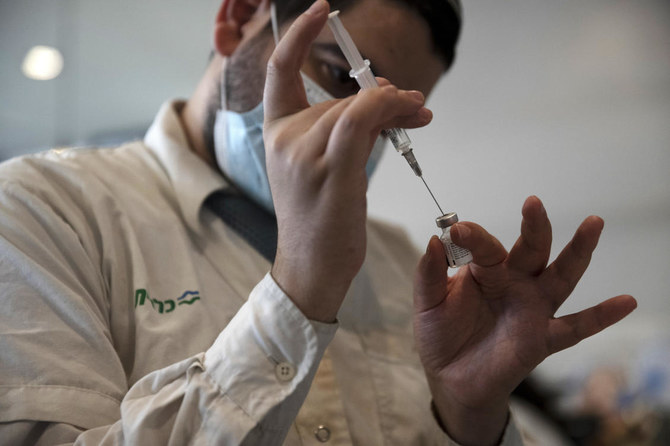
- Israel raced out of the gate early this year to vaccinate most of its adult population
Syrian woman is jailed for life over Istanbul killer blast; over 20 others also get prison sentences
Syrian woman is jailed for life over Istanbul killer blast; over 20 others also get prison sentences
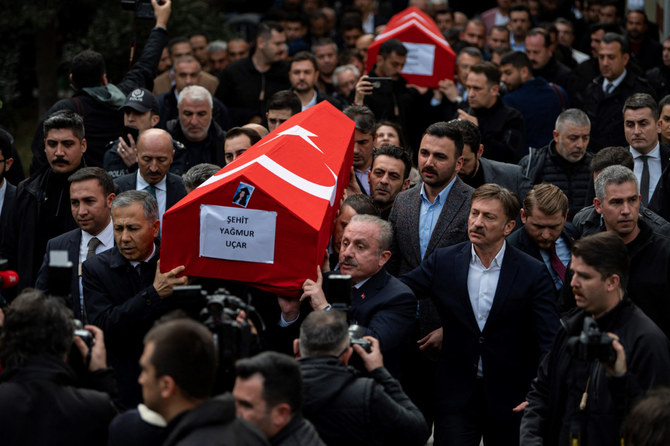
- Ahlam Albashir was given a total of seven life sentences by a Turkish court for carrying out the attack in Istiklal Avenue on Nov. 13, 2022
- Twenty others were given prison sentences ranging from four years to life
JEDDAH: A Syrian woman who planted a bomb that killed six people in Istanbul’s main shopping street 18 months ago was jailed for life on Friday.
Ahlam Albashir was given a total of seven life sentences by a Turkish court for carrying out the attack in Istiklal Avenue on Nov. 13, 2022. Six Turkish citizens, two members each from three families, died in the blast in the busy street packed with shoppers and tourists. About 100 people were injured.
More than 30 other people were accused in connection with the explosion. Four were released from prison on Friday, and a further 10 were ordered to be tried separately in their absence because they could not be found.
Twenty others were given prison sentences ranging from four years to life. Of those, six received aggravated life imprisonment for murder and “disrupting the unity and integrity of the state.”
Turkiye blamed Kurdish militants for the explosion, and said the order for the attack was given in Kobani in northern Syria, where Turkish forces have conducted operations against the Syrian Kurdish YPG militia in recent years.
The YPG and the outlawed PKK Kurdish separatist group, which has fought a decades-old insurgency against the Turkish state, denied involvement in the attack. No group admitted it.
Istanbul has been attacked in the past by Kurdish, Islamist and leftist militants. A wave of bombings and other attacks began nationwide when a ceasefire between Ankara and the PKK broke down in mid-2015.
More than 40,000 people have been killed in the PKK’s conflict with Turkiye since the militant group took up arms in 1984. It is considered a terrorist organisation by Turkiye, the EU and the US.
1 case dismissed, 4 on hold in UN investigation into Oct. 7 allegations against UNRWA staff
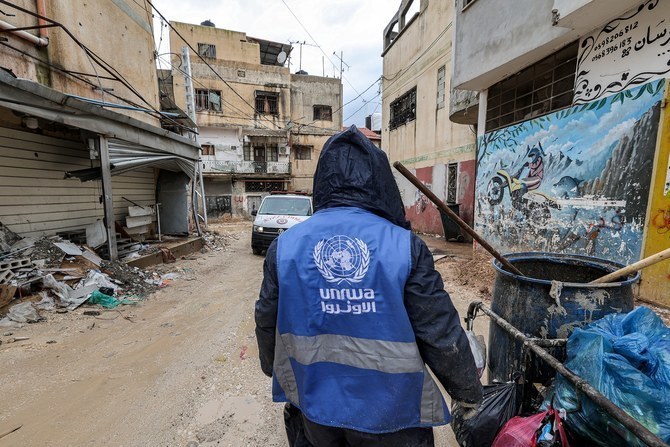
- Investigators have been looking into cases of 12 agency workers accused by Israel in January of participating in attacks by Hamas, and 7 others named later
- 14 cases remain under investigation but the others were dismissed or suspended due to lack of evidence; UN’s internal investigators due to visit Israel again in May
NEW YORK CITY: UN spokesperson Stephane Dujarric said on Friday that the organization’s internal oversight body has been investigating 19 employees of the UN Relief and Works Agency for Palestine Refugees over allegations that they were affiliated with Hamas and other militant groups.
Israeli authorities alleged in January that 12 UNRWA workers participated in the Oct. 7 attacks by Hamas against Israel.
The agency immediately cut ties with the named individuals, and UN Secretary-General Antonio Guterres, in consultation with UNRWA Commissioner General Philippe Lazzarini, ordered an independent review to evaluate the measures taken by the agency to ensure adherence to the principle of neutrality and how it responds to allegations of breaches of neutrality, particularly in the challenging context of the situation in Gaza.
In a wide-ranging report published this week, the investigators, led by Catherine Colonna, a former foreign minister of France, said Israeli authorities have yet to provide any evidence to support the allegations against UNRWA workers. They also noted that Israel had not previously raised concerns about any individuals named on the agency staffing lists it has been receiving since 2011.
They stated in the report: “In the absence of a political solution between Israel and the Palestinians, UNRWA remains pivotal in providing life-saving humanitarian aid and essential social services, particularly in health and education, to Palestinian refugees in Gaza, Jordan, Lebanon, Syria and the West Bank.
“As such, UNRWA is irreplaceable and indispensable to Palestinians’ human and economic development. In addition, many view UNRWA as a humanitarian lifeline.”
Guterres also ordered a separate investigation by the UN’s own Office of Internal Oversight Services to determine the accuracy of the Israeli allegations. The mandate of the OIOS, an independent office within the UN Secretariat, is to assist the secretary-general in the handling of UN resources and staff through the provision of internal audit, investigation, inspection and evaluation services.
Dujarric said the 19 members of UNRWA staff under investigation included the 12 named by the Israeli allegations in January, whose contracts were immediately terminated, and seven others the UN subsequently received information about, five in March and two in April.
Of the 12 employees identified by Israeli authorities in January, eight remain under OIOS investigation, Dujarric said. One case was dismissed for lack of evidence and corrective administrative action is being explored, he added, and three cases were suspended because “the information provided by Israel is not sufficient for OIOS to proceed with an investigation. UNRWA is considering what administrative action to take while they are under investigation.”
Regarding the seven additional cases brought to the attention of the UN, one has been suspended “pending receipt of additional supporting evidence,” Dujarric said.
“The remaining six of those cases are currently under investigation by OIOS. OIOS has informed us that its investigators had traveled to Israel for discussions with the Israeli authorities and will undertake another visit during May.
“These discussions are continuing and have so far been productive and have enabled progress on the investigations.”
The initial allegations against some members of its staff threw the agency, which provides aid and other services to Palestinian refugees in Gaza and across the region, into crisis. The US, the biggest single funder of UNRWA, and several other major donors put their contributions to the organization on hold.
In all, 16 UN member states suspended or paused donations, while others imposed conditions on further contributions, putting the future of the agency in doubt. Many of the countries, including Germany, later said their funding would resume. However, US donations remain on hold.
37 million tonnes of debris in Gaza could take years to clear: UN
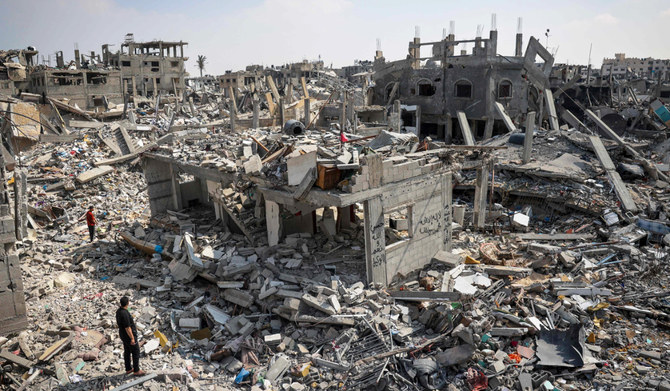
- “We do know that we estimated 37 million tonnes of debris, which is approximately 300 kg per square meter,” Lodhammar added
GENEVA: There are some 37 million tonnes of debris to clear away in Gaza once the Israeli offensive is over, a senior official with the UN Mine Action Service said on Friday.
And unexploded ordnance buried in the rubble would complicate that work, said UNMAS’ Pehr Lodhammar, who has run mine programs in countries such as Iraq.
It was impossible to say how much of the ammunition fired in Gaza remained live, said Lodhammar.
“We know that typically there is a failure rate of at least 10 percent of land service ammunition,” he told journalists in Geneva.

“We do know that we estimated 37 million tonnes of debris, which is approximately 300 kg per square meter,” he added.
He said that starting from a hypothetical number of 100 trucks would take 14 years to clear away.
Lodhammar was speaking as UNMAS launched its 2023 annual report on Friday.
The war in Gaza between Israel and Hamas erupted when Hamas launched an unprecedented attack on Israel on Oct. 7.
Also on Friday, the head of an aid group warned that an Israeli assault on southern Gaza’s Rafah area would spell disaster for civilians, not only in Gaza but across the Middle East,
Jan Egeland said the region faced a “countdown to an even bigger conflict.”
Egeland, the secretary-general of the Norwegian Refugee Council, also said that 1.3 million civilians seeking refuge in Rafah — including his aid group’s staff — were living in “indescribable fear” of an Israeli offensive.
Egeland urged Israeli Prime Minister Benjamin Netanyahu not to proceed with the operation.
“Netanyahu, stop this. It is a disaster not only for the Palestinians, it would be a disaster for Israel. You will have a stain on the Israeli conscience and history forever,” he said.
The NRC head spoke to Reuters in Lebanon, where he visited southern villages that he said were caught in a “horrific crossfire” between the Israeli military and Hezbollah.
“I am just scared that we haven’t learned from 2006,” said Egeland, referring to the month-long war between Hezbollah and Israel that was the two foes’ last bloody confrontation, during which he headed the UN’s relief operations.
“We do not need another war in the Middle East. At the moment, I’m feeling like (this is a) countdown to an even bigger conflict,” he said.
Turkiye’s Erdogan postpones tentative White House visit, sources say
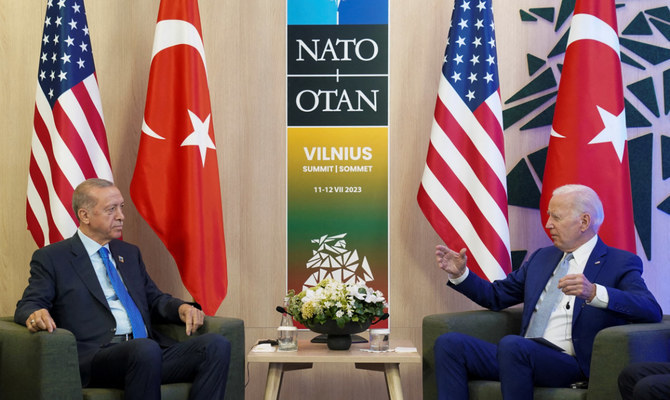
- A new date will soon be set due to a change in Erdogan’s schedule, the Turkish official said
- The source familiar with the matter, speaking on condition of anonymity, said it was unclear what prompted the postponement
WASHINGTON/ANKARA: Turkish President Tayyip Erdogan has postponed a White House meeting with President Joe Biden, a source familiar with the situation and a Turkish official said on Friday of a visit that had been tentatively planned for May 9.
A White House spokesperson, while not confirming the May 9 date, said: “We look forward to hosting President Erdogan at the White House at a mutually convenient time, but we have not been able to align our schedules and do not have any visit to announce at this time.”
A new date will soon be set due to a change in Erdogan’s schedule, the Turkish official said, requesting anonymity. The source familiar with the matter, speaking on condition of anonymity, said it was unclear what prompted the postponement.
The White House never formally announced the visit but a US official told Reuters in late March that following Turkish Foreign Minister Hakan Fidan’s visit to Washington, the White House offered and Ankara had accepted May 9 for a meeting between Biden and Erdogan.
That would have been the first bilateral visit to Washington since 2019 when Erdogan met with then President Donald Trump, a Republican. He and Biden have met a few times at international summits and spoken by phone since the Democratic US president took office in January 2021.
Ties between the US and Turkiye have been long strained by differences on a range of issues. While they have thawed since Ankara ratified Sweden’s NATO membership bid earlier this year, tensions persist over Syria and Russia and the war in Gaza.
Erdogan visited neighboring Iraq this week. Last weekend, he met with Hamas leader Ismail Haniyeh in Istanbul, the first meeting between Erdogan and a Hamas delegation headed by Haniyeh since Israel began its military offensive in the Gaza Strip following Hamas’ Oct. 7 attack.
Netherlands will consider resuming support to Palestinian UNRWA agency
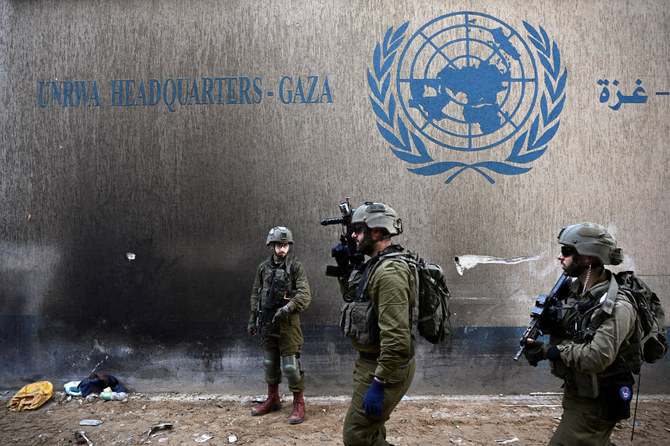
- The decision follows an investigation by the former French foreign minister Catherine Colonna
- The Colonna-led review of the agency’s neutrality concluded Israel had yet to back up its accusations
AMSTERDAM: The Dutch government on Friday said it would consider resuming funding for the UN agency for Palestinians (UNRWA) in Gaza if the agency implements recommendations to strengthen its neutrality.
The decision follows an investigation by the former French foreign minister Catherine Colonna released on Monday into whether some UNRWA employees were involved in the Oct. 7 attack by Hamas.
The Colonna-led review of the agency’s neutrality concluded Israel had yet to back up its accusations that hundreds of UNRWA staff were operatives in Gaza terrorist groups.
The Dutch government said it had already given its yearly donation to UNRWA in January, before the accusations against the agency came to light. It was one of several European countries that paused funding for the agency after the allegations were levied.
It said it did not foresee any additional donations in the near future, but would consider UNRWA as a potential partner if requests for aid were made.




